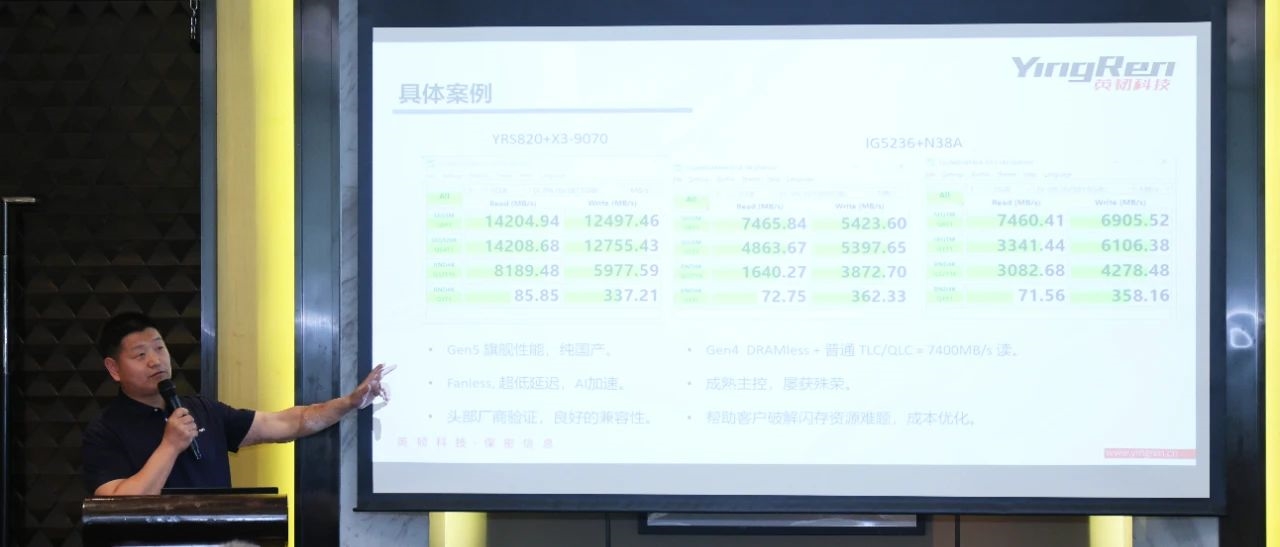Don’t be surprised if the nextbest SSDsdon’t come with a Phison or Silicon Motion controller. Chinese publicationMyDriversreports that Yingren Technology, aka InnoGrit, has commenced mass production on the YRS820, the company’s first consumer PCIe 5.0 SSD controller.
Yingren started producing theYR S900, an enterprise PCIe 5.0 controller, last year, so it was only a matter of time before the manufacturer focused its time and resources on a consumer product. The YRS820 shares many similarities with the YR S900. For one, the YRS820 is likely a domestic controller that Yingren has developed for the Chinese market. Similar to the YR S900, the YRS820 depends on the RSIC-V architecture to avoid infringing U.S. export restrictions.

The company is taking advantage of the AI hype and has reportedly integrated AI features into the YRS820 controller. It didn’t go into detail, but claims that the YRS820 is excellent for AI PCs and has AI-powered data acceleration to minimize latency and enhance performance for specific applications.
Like lots of tech coming out of China, the YRS820 still has some mysterious aspects. For example, Yingren doesn’t reveal who makes the controller or what node it’s based on. While we know it uses RISC-V, there is no core count or clock speed information. According to the presentation, the YRS820 sports a four-channel PCIe 5.0 interface with support for up to eight NAND flash memory channels. Vendors can pair the YRS820 with 3D TLC or QLC NAND. The controller happily embraces NAND with a transmission rate of up to 2,667 MT/s. The maximum supported capacity is 8TB, which is more than enough since that’s the current ceiling for M.2 SSD drives.

On paper at least, the YRS820 has what it takes to rivalPhisonandSilicon Motion. Yingren paired the YRS820 controller with YMTC’s 232-layerX3-9070TLC NAND. The duo achieved sequential read and write speeds over 14.2 GB/s and 12.4 GB/s, respectively. Meanwhile, random performance was at 2,000,000 IOPS reads and 1,500,000 IOPS writes. The X3-9070 runs at 2,400 MT/s, so there is still some untapped potential in the YRS820.
Yingren claims that the YRS820 delivers on performance claims with a fanless design. We’ll have to see this with our own eyes, as current PCIe 5.0 SSDs run hot and require bulky heatsinks and active coolers to maintain their performance when under heavy load. It would appear that Yingren presented the numbers on a slide, but didn’t perform a live demonstration of the controller.
The company is still validating the YRS820 with domestic NAND and DRAM manufacturers to expand its domestic ecosystem in China. In the meantime, we know it gels well with YMTC’s NAND. Yingren only confirmed that the YRS820 is already in mass production but didn’t share a specific date on when YRS820-powered SSDs will hit the retail market.
Get Tom’s Hardware’s best news and in-depth reviews, straight to your inbox.
Zhiye Liu is a news editor and memory reviewer at Tom’s Hardware. Although he loves everything that’s hardware, he has a soft spot for CPUs, GPUs, and RAM.